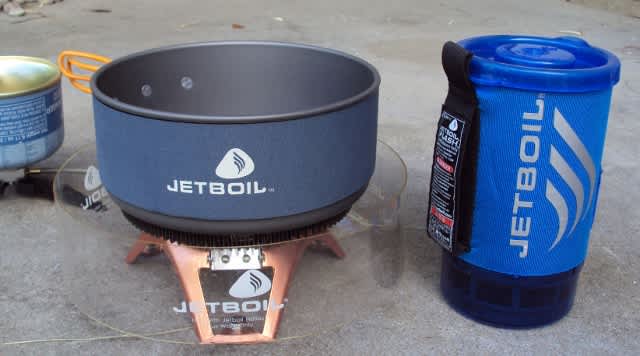Reinventing Fire with Jetboil Camping Stoves
OutdoorHub Contributors 08.15.12


This review originally appeared on Wired.com
Although I’m a geek at heart and love new technology, I’m also a little stubborn to change at times. Case in point: I’ve been using the same style of clunky propane camping stove for 25+ years now. How’s that for resistance to change? Fortunately, I received a couple of Jetboil stoves for review this spring, and have taken them along on all the family camping trips since then. After giving the Jetboils a good workout, I’m now ready to offer an opinion on these high-tech stoves.
For those of you who are impatient, the short version of the story is that I’m very impressed with Jetboil. The functionality, weight, design, and overall quality is fantastic, and I wholeheartedly recommend them. But for those of you who are interested in the detail to back that opinion up, read on…

Jetboil produces several models of stove, all of which share the same general design, with variation in size and weight. Each stove includes a burner and igniter, a pot with high-efficiency heat-transfer fins on the bottom, an insulating neoprene wrap for the pot, lids, and support stands. The larger Helios model also includes a draft shield that does a great job of blocking the burner from the wind.


As shown above, the Jetboil stoves are fueled via an external fuel cylinder. The cylinders are available in three sizes (100g, 230g, 450g), and the smallest size even stows compactly inside the pot of the Sol. The fuel in each cylinder is a four-season blend of propane and isobutane; this mix makes for superior performance, since, according to Jetboil, “propane provides higher vapor pressure for better performance in cold weather, and isobutane provides more constant pressure as the fuel level gets low.”
Speaking of the fuel cylinders, the only criticism I have of the Jetboil system is the fact that the Jetfuel canisters cannot be topped-up. This means that you’ll end up with half-full cylinders kicking around if you prefer to take a full one with you on a trip. And yes, the fuel canisters are recyclable once empty (Jetboil suggests puncturing them before feeding them to your blue box, and they even sell an inexpensive “Crunchit” tool to do the job).

In terms of performance, the Jetboil is impressive in just how fast it can heat water or food. For the Helios, a full liter of cold water can be brought to a rolling boil in about 4m30s. The bottom heat-transfer fins and insulating neoprene side-wrap do a great job of conveying and retaining heat, which is greatly appreciated by hungry hikers. The heating efficiency also means that fuel cylinders last a long time – a single 230g cylinder will boil 24 liters of water, according to the Jetboil website.
The intensity of the heat output of the stove can also be theoretically adjusted via a regulation valve, though in my experience, I really didn’t see much difference in gas flow with it wide open or partially closed. The output seems to lag about 10 seconds behind any adjustment to the valve though, so perhaps I just wasn’t patient enough in observing any effect. That lag also confused me the first couple of times I tried to turn off the stove, since the stove keeps burning for about 10 seconds after the gas is turned off.

I was also very impressed by the piezo-electric igniter on the Jetboils. The push-button switch is easy to use and works perfectly every time. No more burnt fingers from messing around with matches or lighters!

The final design point worth noting is that the Jetboil stoves are all extremely compact and snag-proof. They don’t take up much space at all in a pack, and they won’t get tangled in your other gear. As well, they are reasonably light (the Helios weighs 28oz/793g, and the Flash weighs 14oz/400g), which is appreciated on long back-country hikes.

Prices on the stoves are reasonable ($65 – $125, depending on model), fuel is economical ($6 for a 230g cylinder), and Jetboil offers plenty of additional accessories and replacement parts.
Overall, I am completely sold on Jetboil and their gear. The stoves are terrifically functional, compact, and elegant. The variety of models available means that there is a version perfectly suited to whatever your outdoor activity may be. I guess that means I’m set for the next 25 years of camping…
Note: GeekDad received review models of the stoves from Jetboil.

